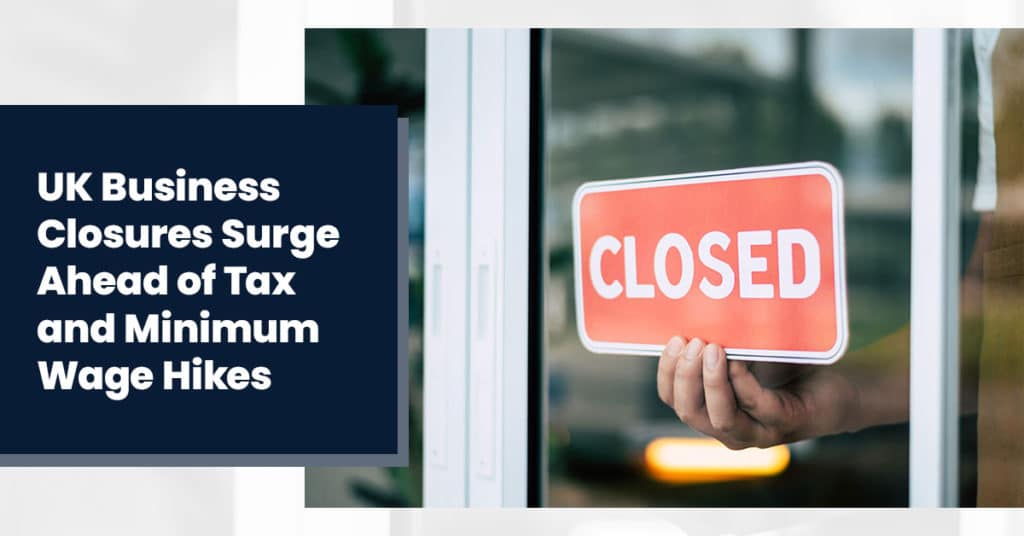Running a business in the UK has never been easy, but things have become even harder with rising costs, inflation and new government regulations. One of the most significant issues businesses now face is minimum wage hikes and higher taxes. While these changes are meant to help workers, they make it even more difficult for businesses, especially smaller organisations and start-ups. As a result, more businesses are shutting down across the country. In this blog, we’ll discuss how tax and minimum wage hikes affect businesses, why more are closing, and what business owners can do to survive these challenging times.
Day-to-day costs keep climbing
The cost of running a business has steadily increased across the board. From energy bills and supplier prices to rent and wages, business owners are feeling the pinch. For many, wages make up a large portion of their expenses, particularly in industries like hospitality, retail and manufacturing where staffing needs are high.
How minimum wage hikes affect small businesses
The minimum wage hikes for small businesses are a bit of a catch-22. On one hand, they’re necessary to ensure workers earn a fair wage and can live comfortably. On the other hand, organisations are already grappling with rising costs, and this new wage increase just makes it harder to manage.
For example, in the hospitality sector, which relies on low-wage workers, this increase can really hurt. Restaurants, cafes and bars usually operate on thin profit margins, and without an increase in revenue to match the wage increase, some companies have tough decisions to make. When you add increased costs for rent and utilities on top of wage hikes, many owners are wondering if it’s even possible to keep the doors open.
Tax increases add more pressure
Alongside minimum wage hikes, businesses are also facing higher taxes. This is happening because the government is trying to raise money to cover public spending, and businesses, both big and small, are being asked to pay more. For many small businesses, this extra tax burden can drain resources they might have used for innovation or day-to-day operations.
In industries already under strain, such as retail and leisure, these extra financial demands can push them over the edge. As covering wages, rent and taxes becomes more challenging, many businesses simply can’t keep up and are forced to shut down.
Why are more businesses closing?
So, why are so many companies closing down? The main reasons are increasing costs and limited resources. Many businesses don’t have enough money saved up or access to credit to cover the extra expenses, which leaves them with no choice but to close. Here’s why more companies are shutting down:
– Rising costs: Many small businesses can’t handle the growing financial pressures from wage hikes and taxes. Without enough savings or access to credit, they simply can’t keep up.
– Cash flow issues: As wages and prices increase, many organisations struggle to manage their cash flow. Even if they’re making a profit, they may not have enough money to cover expenses, leading to financial trouble.
– Uncertainty and lower spending: With the cost of living rising for everyone, consumers are spending less on things that aren’t necessities. That means businesses in non-essential industries see less demand, which risks their survival.
– Rising debt: With increasing taxes, wages and bills, many businesses are taking on more debt to stay afloat, which can quickly lead to insolvency if they can’t pay off their obligations.
What can business owners do?
Although the situation looks tough, there are things business owners can do to survive these difficult times. The key is to stay proactive and seek advice early. Here’s what business owners can do to help their business stay afloat:
– Keep track of your finances: Regularly check the financial health of your business. This means looking at cash flow, debt and costs. You can spot problems early and take action before they get out of hand by keeping an eye on things.
– Get professional help: If you’re struggling to manage your finances, consider talking to an Insolvency Practitioner (IP). These experts can help you determine what steps to take, whether restructuring your business or looking at insolvency solutions like a Company Voluntary Arrangement (CVA).
– Cut costs smartly: Look for ways to reduce your outgoings without hurting the quality of your service. You could renegotiate contracts, find cheaper suppliers or cut back on unnecessary overheads.
– Diversify your business: If your business depends on just one product or service, it might be time to try something new. Diversifying your offerings or finding new markets can reduce risk and help you bring in more income.
– Increase prices carefully: While raising prices might be necessary to cover escalating overheads, it’s important to do so wisely. Understand your customers and make sure the price increase won’t push them away.
Finding a way forward
The rise in UK business closures is worrying, mainly due to minimum wage hikes, higher taxes and growing expenditure. While these changes are essential for workers and the economy, they’re putting more strain on businesses and making it increasingly difficult for them to stay open. But there’s hope. By getting advice early and planning ahead, business owners can find ways to reduce the financial burden and keep their businesses going. Whether cutting unnecessary costs, exploring new revenue streams, or seeking expert insolvency support, taking action early can make all the difference in staying afloat.
Need help navigating tough times?
If your business struggles with financial pressures, don’t wait until it’s too late. We’re here to help. Our experienced Insolvency Practitioners can provide the advice you need to keep your business afloat, whether it’s restructuring, negotiating with creditors or exploring insolvency solutions like CVAs. Let’s work together to find the best solution for your business.

